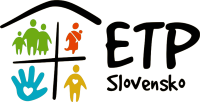Building Hope – Improving Life in Roma Ghettos
According to the OECD Review of Policies to Improve Effectiveness of Resources Use in Schools as of January 2015, “Integration of the Roma minority represents a pressing social and economic challenge for the Slovak society…the country struggles with integration of Roma minority both to the labour market and the society as such.”
Every year a new cohort of five thousand pupils born in segregated Slovak Roma ghettos start their elementary schooling. About half of them fail in their first years. The dropout rate is dramatic. In addition to the generally known reasons, including lack of command of the Slovak language, low parental education, high absenteeism and appalling housing environments, Slovak teachers are simply not well prepared to educate children from segregated Roma communities.
ETP Slovakia, therefore, pays great attention to the development of the national curricula to make it suitable to enable Roma children from segregated communities to catch up with their peers who were more fortunate in the lottery of birth and were born to the families with better addresses.
The four-year project Building Hope – Improving Life in Roma Ghettos – that started in August 2014 is designed to verify, in randomized controlled trials (RCTs), innovative accelerative methods in education of children born in segregated Roma communities, embracing the approach “from cradle to career”, as well as to provide comprehensive and holistic social services to their families. The overall aim of the Project is to increase the number of students from Roma ghettos enrolled into high schools and universities, reduce drop-out rates, increase the number of adults in employment, and, in general, significantly improve the quality of life within Roma ghettos.
The Project is a continuation of the activities of the Community on Its Way to Prosperity Project (2012-2015) that was implemented in ten communities.
The Building Hope project is being implemented in three localities: Rankovce, Stará Ľubovňa and Veľká Ida. We decided to focus on these three communities to create stronger partnerships on local levels and intensify the cooperation with formal education settings (schools, nurseries, free-time centers), Municipalities, local non-profit organizations, churches, businesses, and other stakeholders.
We believe that, in the long run, good quality local cooperation has great potential to generate results which make a significant positive impact on the whole society.
In summary, the Project demonstrates our current effort to grow deeper and reach wider, strengthening social inclusion through:
- testing innovative pedagogical methods and providing recommendations to relevant public institutions, including the Ministry of Education, in order to change current National educational strategies for Slovak pedagogues who teach children from segregated Roma ghettos;
- providing complex social and educational services to children, young adults and their parents, in cooperation with local governments and schools in the local community centers and in a newly built kindergarten utilizing “from cradle to career” approach.
We emphasize the importance of experimental verification of accelerative educational methods, new to Slovakia, in the environment of both non-formal (Community Centres) and formal (schools) education systems. We have extended our cooperation with primary schools, we support teachers and their assistants and provide mentors for Roma students on an individual basis. The innovative education methods and approaches for teachers and other education professionals help them to better understand the issues faced by the children from segregated ghettos. Teachers learn new strategies for assisting their pupils in developing internal motivation and general cognitive ability. We are happy to see how teachers transform their attitudes and enhance their skills to attend to the needs of the children more effectively and efficiently.
In order for decisions about public spending in education to be wise, policymakers in Slovakia and the EU, should collect rigorous data before attempting to reshape the management and funding of schools.
Therefore the Building Hope Project collects evidence and data gathered from RCTs (organized by ETP in partnership with the Pedagogical Faculty of the Charles University in Prague); describes in detail the innovative methods of social work and education, which prove to be highly effective in the social inclusion of the poorest and most neglected inhabitants of Europe. The rigorous data, novel educational and social work methods will be shared with representatives of the National Government and EU institutions.
“I would be happy to see the message spread that Roma children are capable and have a desire to learn; that helping and supporting them is the right thing to do. They deserve a chance. Our view of them should be unobscured; we need to break the prejudices and lies surrounding them. My dream is to leave the children I teach with the kind of experience that helps them move forward; just as I have been able to progress thanks to the people I have met in my life,” says Mária Heveriová, our remedial teacher.
Project Implementation Dates: August 2014 / June 2018
Support:
Sorry, photo gallery is empty.

